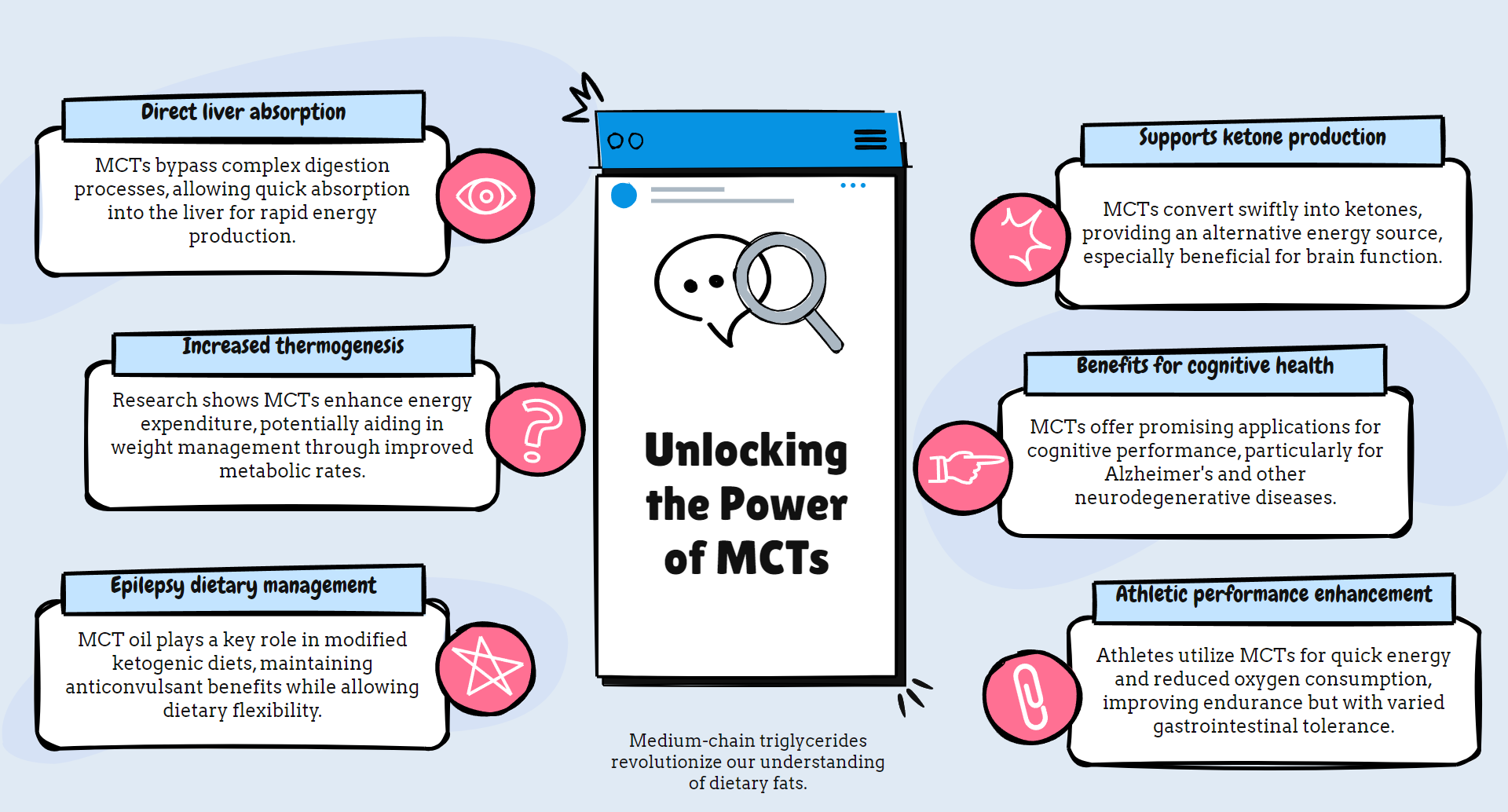
Why MCT Oil Transforms Modern Nutrition Science
Why MCT Oil Transforms Modern Nutrition Science
Fat burns faster when it's medium-chain. This simple truth powers a nutritional revolution that's reshaping our understanding of dietary fats. Medium-chain triglyceride (MCT) oil stands at this intersection of biochemistry and practical nutrition, offering unique metabolic properties that challenge conventional wisdom about fats.
The science behind MCT oil reveals a fascinating metabolic shortcut. Unlike long-chain fatty acids that require complex digestion and transport mechanisms, MCTs bypass traditional pathways. They travel directly from the digestive system to the liver, where they're rapidly converted to ketones and energy. This metabolic efficiency explains why MCTs have captured attention across medical communities, fitness circles, and nutrition science.
The Biochemical Advantage
Understanding MCT oil begins with its structure. Medium-chain triglycerides contain fatty acids with 6-12 carbon atoms, primarily caproic (C6), caprylic (C8), capric (C10), and lauric (C12) acids. This molecular architecture allows MCTs to dissolve in aqueous solutions without bile salts or pancreatic enzymes, enabling direct absorption into the portal vein.
This structural difference creates profound metabolic consequences. MCTs reach the liver rapidly, where they undergo beta-oxidation to produce acetyl-CoA, which can enter the Krebs cycle for immediate energy production or convert to ketone bodies. This process occurs even in the presence of carbohydrates, unlike long-chain fatty acids that require carbohydrate restriction to induce ketogenesis.
The thermogenic effect further distinguishes MCTs. Research indicates they increase energy expenditure compared to long-chain triglycerides, potentially supporting weight management through enhanced metabolic rate and reduced fat storage.
Clinical Evidence and Applications
The therapeutic potential of MCT oil extends beyond theoretical biochemistry. Clinical research demonstrates several promising applications, though some require further investigation.
In cognitive function, ketones derived from MCTs provide an alternative energy source for brain cells. This mechanism underlies research into MCT supplementation for Alzheimer's disease, where glucose metabolism becomes impaired. Studies show modest improvements in cognitive performance among patients receiving MCT supplementation, particularly among non-APOE4 carriers.
For epilepsy management, MCT oil serves as a cornerstone of modified ketogenic diets. By providing readily available ketones, MCTs help maintain the anticonvulsant benefits of ketosis while allowing greater dietary flexibility than traditional ketogenic protocols. This approach has proven particularly valuable in pediatric epilepsy cases resistant to conventional treatments.
Athletes increasingly incorporate MCTs for performance benefits. The rapid energy availability and reduced oxygen consumption during beta-oxidation may enhance endurance. However, gastrointestinal tolerance varies substantially between individuals, necessitating personalized implementation strategies.
Metabolic Health Considerations
The relationship between MCT oil and metabolic health reveals intriguing paradoxes. Despite being saturated fats, MCTs appear to improve several cardiometabolic parameters. Research indicates potential benefits for insulin sensitivity, lipid profiles, and inflammation markers when MCTs replace other dietary fats.
Weight management applications stem from several mechanisms. MCTs increase satiety hormones, enhance thermogenesis, and promote fat oxidation rather than storage. A meta-analysis of 13 randomized controlled trials found modest but significant reductions in body weight, waist circumference, and total body fat among participants consuming MCTs compared to long-chain triglycerides.
The gut microbiome represents an emerging frontier in MCT research. Preliminary evidence suggests MCTs may influence microbial composition and metabolite production, potentially contributing to their systemic effects through microbiome modulation.
Limitations and Practical Implementation
Scientific integrity requires acknowledging the limitations in current MCT research. Many studies feature small sample sizes, short durations, and varying MCT compositions. The four-carbon chain length variants produce different metabolic effects, yet research often fails to specify exact compositions.
Gastrointestinal distress remains the primary adverse effect, particularly with rapid introduction or high doses. Gradual titration typically improves tolerance. Quality also varies significantly between commercial products, with some containing substantial amounts of lauric acid (C12), which behaves more like a long-chain fatty acid metabolically.
Clinical implementation requires consideration of individual factors including genetic variations in fat metabolism, existing health conditions, medication interactions, and personal tolerance. The therapeutic dose range varies by application, typically between 5-70g daily, necessitating personalized approaches.
Future Directions
The frontier of MCT research extends into several promising domains. Neurodegenerative disease applications beyond Alzheimer's, including Parkinson's and traumatic brain injury recovery, show preliminary promise. Metabolic syndrome management protocols incorporating MCTs warrant larger clinical trials. The potential synergistic effects when combined with other bioactive compounds, such as polyphenols or omega-3 fatty acids, represent unexplored therapeutic possibilities.
As research methodologies advance, we need studies examining long-term safety, optimal dosing strategies, and genetic factors influencing response variability. The development of targeted MCT formulations with specific carbon chain distributions for particular clinical applications may revolutionize precision nutrition approaches.
Medium-chain triglycerides challenge our binary classification of dietary fats as simply "good" or "bad." They demonstrate how molecular structure creates distinct metabolic fates, reinforcing the principle that nutritional effects depend on specific biochemical properties rather than broad macronutrient categories.
This nuanced understanding of MCT oil illuminates a broader truth about nutritional science: metabolic pathways matter more than simplistic categorizations. As we continue unraveling these complex interactions, MCT oil stands as a compelling example of how biochemical mechanisms translate into practical nutritional applications, bridging laboratory science and clinical practice in the ongoing evolution of evidence-based nutrition.
